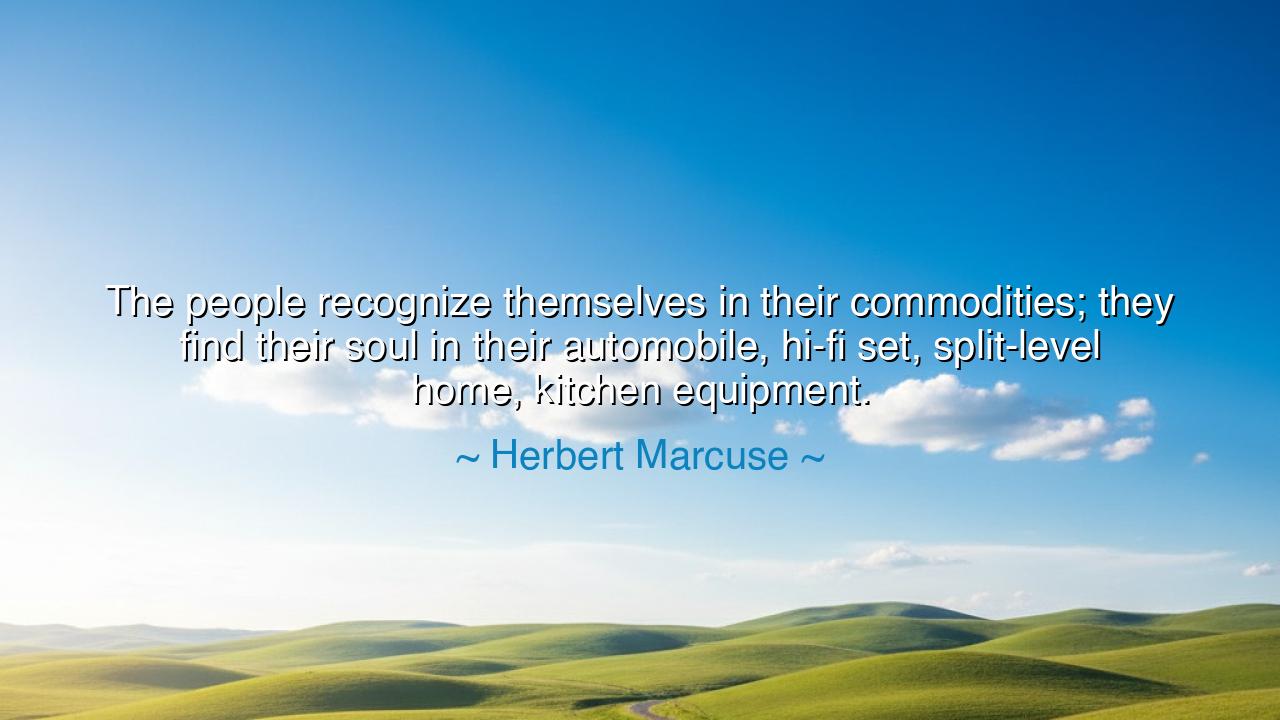
The people recognize themselves in their commodities; they find
The people recognize themselves in their commodities; they find their soul in their automobile, hi-fi set, split-level home, kitchen equipment.






The words of Herbert Marcuse, when he wrote, “The people recognize themselves in their commodities; they find their soul in their automobile, hi-fi set, split-level home, kitchen equipment,” are not the complaint of a cynic, but the lament of a sage who saw a great tragedy unfolding beneath the glitter of modern progress. In these few lines, Marcuse exposes the spiritual poverty hidden behind material wealth — the slow enslavement of the human soul to the objects it creates. His is the voice of one crying out from the age of consumption, warning that when men and women begin to define themselves by the things they possess, they cease to know who they truly are.
The origin of this quote lies in Marcuse’s seminal work, One-Dimensional Man (1964), written during an age of rapid industrial expansion and post-war prosperity. He observed a society intoxicated by comfort and convenience — a people who believed themselves free because their lives overflowed with commodities, yet who had become bound to them in unseen chains. To Marcuse, this was the tragedy of modern civilization: that the tools once made to serve humanity had become its masters. Men no longer asked what was good or just; they asked only what was new, efficient, or entertaining. In worshiping their machines, they had begun to trade depth for distraction, and meaning for motion.
His words recall an ancient pattern — the transformation of tools into idols. In every age, humanity has created wonders: the plow, the temple, the ship, the clock. Yet the ancients, though they crafted, did not confuse the creation with the creator. They knew that a sword does not make a warrior, nor a temple a saint. But in the modern world, Marcuse saw that people had lost this wisdom. The automobile was not merely a carriage of steel; it became a symbol of identity, a moving mirror of pride. The home, once a refuge of spirit, became an exhibition of possessions. The kitchen, once a place of gathering and sustenance, became a shrine to gadgets. The soul — once rooted in virtue and imagination — had been outsourced to objects.
Consider the story of King Midas, who prayed that everything he touched might turn to gold. At first, he rejoiced, for his halls glittered with wealth beyond measure. But when he tried to eat, his food became metal; when he tried to embrace his daughter, she too turned to gold. His blessing became his curse, for he had mistaken possession for fulfillment. So too, Marcuse warns, does the modern man, who surrounds himself with things yet starves for meaning. He has gained the world but lost his reflection within it. His soul has been exchanged for his commodities — he recognizes himself only in what he owns.
Yet Marcuse’s words are not without hope. To see the sickness is to begin the cure. He calls upon us to awaken from this one-dimensional existence, to reclaim our humanity from the glittering prison of consumption. The ancients would have called this awakening a return to balance — the harmony between body and spirit, between creation and contemplation. For the truth is this: objects are not evil, but our attachment to them blinds us. The car may serve you, but it cannot define you; the house may shelter you, but it cannot fill the emptiness within. Only thought, love, and wonder can do that — the treasures that no market can sell.
In our own time, this warning has only grown more urgent. The names of the commodities have changed — the smartphone, the social media profile, the luxury brand — but the illusion remains. We polish our digital identities like sacred icons, measuring our worth by numbers, followers, and features. Yet deep within, we remain unsatisfied, haunted by a silence we cannot name. Marcuse saw this coming: a people so distracted by comfort that they no longer rebel, so entertained that they no longer think, so surrounded by images that they forget their inner vision.
The lesson is clear and eternal: own things, but do not let things own you. Seek joy not in possession, but in perception. Measure your life not by what you display, but by what you understand. Build homes not only of walls, but of peace; cultivate wealth not only of gold, but of character. Let your soul, not your objects, define your worth. For when the machines fall silent and the screens grow dark, only one question remains — who are you, when all you have is gone? The answer to that question is the measure of your freedom.
Thus, let us remember Marcuse’s wisdom as the ancients remembered the warnings of their prophets: the path to liberation does not lie in greater consumption, but in greater consciousness. To live meaningfully is to reclaim the soul from its exile in material things, to rediscover that what we create is meant to serve us, not enslave us. And when we live in that truth — humble, aware, and awake — we will find that no object, however precious, can compare to the beauty of a soul that recognizes itself.






AAdministratorAdministrator
Welcome, honored guests. Please leave a comment, we will respond soon